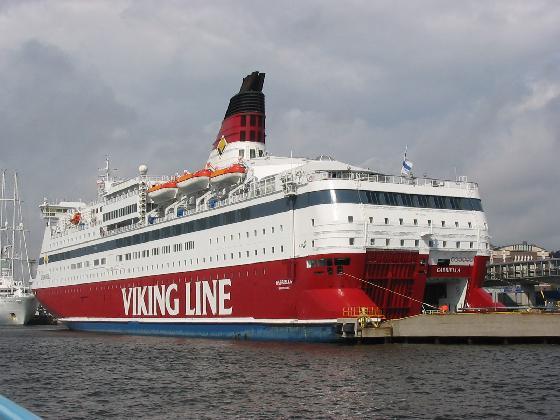Democrat May-June 2008 (Number 108)
Global capital and trade union rights
by Alex Gordon*

Surveying assaults on trade union freedoms and collective bargaining rights around the world today, it is clear that forces of capitalist globalisation are seeking ultimately to neutralise trade unions.
Global capital takes different political forms of course in different parts of the world and today in Europe it is the European Union that is most audacious advancing neo-liberalism's agenda and seeking new ways to tie the hands of trade unions through institutions such as the European Court of Justice and the EU Commission.
That monopoly capital now completely dominates EU political and legal structures can no longer be denied when you examine the contents of the renamed EU Constitution, now known as the Lisbon Treaty.
The Treaty, which creates a de-facto and de-jure, super-state of 'Europe' - a legal entity ruling over 500 million people - would be the only constitution in history to stipulate a neo-liberal economic policy as a legal and constitutional requirement on its members. Provisions include enforced privatisation of public services, restrictions on the right of workers to take strike action and a scorched earth policy towards wage and conditions, collective agreements and national legislation built up over 60 years to protect minimum social and environmental standards.
RMT members as transport workers often bore the brunt of this 'charge of the ultra-right brigade' in past years. Firstly through decades-old 'flags of convenience' practices, allowing UK ship owners to avoid domestic social and health and safety legislation by registering vessels in countries with lax or non-existent regulatory regimes such as Panama and Liberia, a loophole which the EU sought to emulate with its own so-called 'country of origin principle' in its 2006 Services Directive and secondly, through the disaster of a rail privatisation model conceived in a notorious 1991 EU rail directive, first implemented by a British Tory government and now being rolled out Europe-wide.
The neo-liberal mission of the EU has become undeniable as further public sector services are lined up for liberalisation and competition directives, designed to hand over public services to private monopoly capital. In 2007, the EU Parliament voted for full, free-market competition in postal services across the EU from 2011, which trade unions have repeatedly warned threatens jobs and puts Universal Service Provision in jeopardy. Health care is being targeted next with a new EU health directive expected in autumn 2008 designed to accelerate health care privatisation.
Ostensibly as a counter balance to these wide-ranging powers the EU constitution contained a 'Charter of Fundamental Rights' supposedly outlining the rights of citizens and associations such as trade unions. What are these rights and just how fundamental are they in the view of EU institutions?
In any dispute, the EU's own European Court of Justice (ECJ) would have huge new powers under the Treaty of Lisbon to make rulings regarding interpretations of measures proposed in the constitution.
The key question for trade unionists is will this Treaty/Constitution contain instruments that can be used to advantage and protect working people and public services or will it rather increase exploitation and impose 'free market' principles above all others. Recent rulings by the EU court suggest the latter rather than the former.
Some trade union supporters of the Treaty/Constitution argue the Charter includes a 'right to strike'. And so it does. However, the ECJ has already made it clear in at least two recent cases, Laval (Vaxholm) and Viking (December 2007), that employers' rights to 'freedom of establishment' (ECJ-speak for 'hire and fire' policies) are superior to a trade union's rights to call industrial action to defend its members' jobs, pay and conditions.

In the Laval case, the ECJ ruled Swedish unions had breached EU law by forcing a Latvian company employing workers in Sweden to observe local pay agreements, while the verdict in the Viking case suggested unions cannot call a strike against a firm moving its employment from one member state to another in order to lower wages.
In an earlier case the court also made it clear: "the fundamental rights recognised by the Court are not absolute, but must be considered in relation to their social function. Restrictions may be imposed on the exercise of those rights, in particular in the context of a common organisation of the market".
In other words, the ECJ believes that the "common organisation of the market" should be superior to the human right of workers to withdraw their labour.
These rulings constitute a Taff Vale judgement for the 21st century. The supposed crime of the Amalgamated Society of Railway Servants in 1901 was to be 'in restraint of trade' by calling strike action. In 2008 the ECJ is criminalising collective bargaining and any attempt by trade unions to uphold collective agreements using strike action as in conflict with the "common organisation of the market" and employers' 'freedom of establishment'.
ETUC general secretary John Monks told the European Parliament earlier this year: "We have been told that our right to strike is fundamental but not as fundamental as free movement of services".
Employment law solicitors, Thompsons have raised concerns that the ECJ has also established its 'right' to decide on the proportionality of any strike action by workers. That is to say, for the first time a court will not only decide what hurdles a trade union may have to jump over in order to call strike action, but additionally and in an unprecedented assertion of powers the ECJ has arrogated to itself the right to decide what are the issues over which a trade union may call a strike.
Thompsons' head of labour law, Richard Arthur described Viking as "an appalling judgement", which achieved something that even Thatcher's Tory, anti-union laws could not.
If all that wasn't bad enough, in March 2008 the ECJ ruled in the 'Ruffert' case that a public authority in the German state of Lower Saxony could not impose a minimum rate of pay for foreign workers employed on public sector contracts in accordance with German collective agreements in the building sector.
In effect, the ECJ is assisting bad employers to win competitive advantage by undercutting industry standards and trade union collective agreements in the member states in which they seek to operate.
This mechanism was called the 'country of origin' principle when it was supposedly amended out of the controversial EU services directive introduced in 2006. Following huge trade union protests, all mention of 'country of origin' was removed from the directive. However, what is clear from these latest rulings is that the ECJ is re-introducing the concept through court judgments.
We remember our history. Rulings like Taff Vale were intended to criminalise effective trade unionism in Britain. The whole point of trade unions is to maintain and improve labour standards, oppose low pay and prevent social dumping.
However, in the name of 'free market competition' in the 'Ruffert' case, the whole point of the European Court of Justice it seems is to prevent trade unions and government bodies from defending minimum national standards.
What should our response be to this anti-working class onslaught?
Firstly, since British MPs have ensured no referendum in Britain, we must hope that the Irish people reject the Lisbon Treaty in their referendum in June, just as French and Dutch voters rejected the EU constitution in referendums in 2005.
Secondly, we must alert the trade union and labour movement that EU institutions like the Commission and its unaccountable court are vicious weapons in the hands of big business interests like the European Round Table of Industrialists.
Unite general secretary, Derek Simpson's recent call in the Morning Star for the powers of the ECJ to be curbed to allow national government and courts to have sovereignty on collective bargaining issues is a position that could unite millions of trade unionists across Europe.
Similarly, lawyers for the Swedish TUC (LO) argue that: "The political role of the ECJ in the development of EU law has become increasingly apparent - not least through the Laval case. ... Through the backdoor, the judges have gained political power that in practice supersedes that of policy makers. ... The legitimacy and moral authority of the ECJ must be discussed. The absence of such discussion is a serious democratic problem."
The EU is determined to remove anything that gets in the way of its so-called four freedoms: the 'free movement' of goods, capital, services and labour. As the People's Movement in Ireland said recently: "If the Laval judgment against the right to strike was a warning, the Rüffert judgment is an open declaration of war on trade unions".
'Europe' as some people like to call it, is not something happening over there, it is here and it is seeking to undermine trade union power and representative democracy wherever they represent a barrier to untrammeled corporate power and effective wage slavery for many millions of people within its border and far beyond them.
* Alex Gordon was an Executive Committee Member of RMT and later became RMT President.